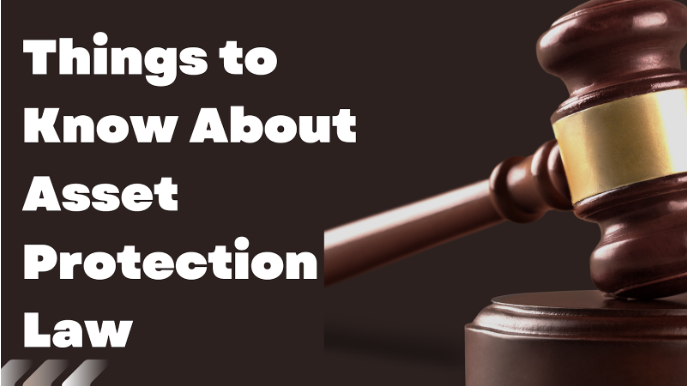Accumulating wealth has never been an easy feat. It could take years of hard work and persistence. Even if you simply became wealthy through inheritance, someone somewhere must have put in the work. Hence, the thought of losing your assets can be unbearable.
Effectively safeguarding and protecting your wealth can give you the peace of mind that you need to live a full and happy life. One of the most effective ways to safeguard your wealth is by using the asset protection law.
Through asset protection laws, you can be sure that your accumulated assets are safe from getting seized by creditors. In this article, we will be looking at the meaning of asset protection law and the things you should know about asset protection.
What Is Asset Protection Law?
Asset protection laws essentially consist of legal strategies for protecting your personal and business assets from seizure. This seizure could result from adverse court judgments, bankruptcy, separation or divorce, death, and other situations.
Different types of assets exist, including accrued assets, fixed assets, frozen assets, intangible assets, capital assets, and liquid assets. Asset protection law makes provisions to shield all types of assets from legal forfeiture.
Asset protection is usually handled by an asset protection attorney who understands asset protection laws and how to use them to your benefit. A good asset protection lawyer will be able to guide you through the right strategies that will best suit the assets that you need to protect.
With an asset protection plan, you wouldn’t need to engage in illegal practices like evading taxes, hiding or concealing your assets, or engaging in a fraudulent transfer.
Asides from protecting your assets from losses, spousal claims, and creditors, asset protection also ensures financial privacy. Your assets are kept from public records, making it difficult for creditors and lawyers to target them.
Asset protection also secures your assets from data breaches and cyber fraudsters. It will be difficult for thieves to target you virtually or hack into your information with an asset protection plan. This is because there will be no information about your assets on the internet.
What You Should Know About Asset Protection
1. Now Is The Best Time to Get Started
While there are options you can follow to shield your assets from an ongoing lawsuit; it might be too late. Very little can be done once a creditor or spouse has initiated a claim over the property.
Thus, the best time to seek asset protection is before any claim or liability arises. Planning ahead puts you in a powerful position. Asset Protection will discourage creditors from filing a lawsuit and also prevent fraudulent rulings. So get an asset protection lawyer and begin immediately.
2. Get Through the Basics
In protecting your assets, there are basic steps you would have to get through. These include,
- Identifying the creditor who could be an individual, a company, or a government institution. This way, you understand better what you’re up against.
- Identifying the debtor.
- The property may be co-owned with a spouse, in which case, they become part of the process. Nature of the claim. The type of claim and any limitations in the lending agreement will determine the type of asset protection needed.
- Nature of the asset. Many types of assets are excluded from creditor claims. For example, the homestead exemption law protects homeowners from having their homes forcefully sold for debt repayment.
Going through these basic steps will help your attorney know how best to proceed.
3. Keep It Simple and Transparent
A common mistake a lot of asset holders make is assuming that the more complex the process, the better protected their assets are. However, this is not correct.
In fact, any overly complicated and twisted asset protection approach will come off looking like you’re trying to hide your assets. The best strategy is to keep it simple and make sure that your processes are transparent.
4. Do Not Mix Business and Personal Accounts
While making an asset protection plan, make sure that you separate personal assets from those belonging to your business. Whatever structure you decide to use, be careful about where you place your funds.
Business and Personal funds should not end up in the same account. That way, you don’t run the risk of having both personal and business funds targeted if you face a financial threat or court judgment.
5. You Still Need Insurance
Asset protection is meant to complement insurance and not to serve as a replacement. In fact, insurance coverage is one of the best ways to safeguard all your assets. There are various common types of insurance, such as business insurance, fleet insurance, limited liability insurance, property insurance, and indemnity insurance.
These different types of insurance policies will help protect your wealth from damage, theft, and other hazards. In case of unfortunate occurrences, insurance coverage can help you recover faster.
6. Offshore Accounts Can Help You
Having an offshore account is a powerful way to protect your wealth. Offshore banks offer a wide variety of options, including checking accounts, savings accounts, and time deposit accounts. The good news is you can access these accounts at any time.
This can be especially helpful for handling emergencies if you’re unable to access your accounts at home. You can also open offshore trust accounts as an added security. Even with court orders, assets in offshore trusts can be unreachable.
7. Use Your Partner’s Name on Some of Your Assets
It would be difficult for creditors to lay hold of all your assets if they’re not all in your name. Also, by law, any property that is under a married couple’s names cannot be seized by creditors. Especially if only one spouse is the named debtor.
So one way to make asset protection easier is to have jointly owned properties or simply transfer ownership to your spouse. Another way to do this is to create a Trust. Your lawyer can guide you on the procedures for creating Trusts. This will effectively reduce the number of assets in your name.
Conclusion
With the growing risks involved in today’s business and financial world, asset protection has become fundamental. This means that you must start effectively protecting your wealth now.
Understanding what you’re up against is crucial in deciding the best strategies to use. This will also help you in planning ahead before adverse situations arise. You must employ the services of a good attorney to protect your assets. An expert understands asset protection laws better and can help you implement effective strategies.
You must also make sure to review your strategies regularly. With time, laws may change, and your personal circumstances may change as well. So it is important that you move with the times and adjust your strategies as the need arises.

